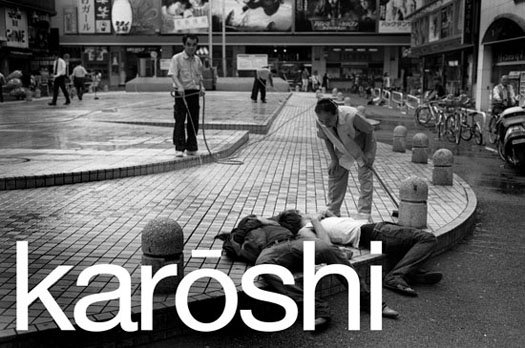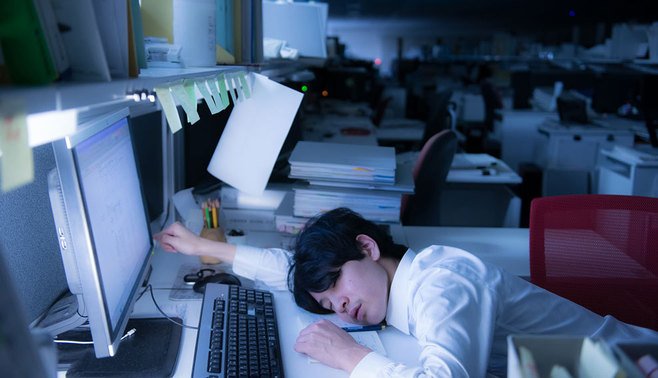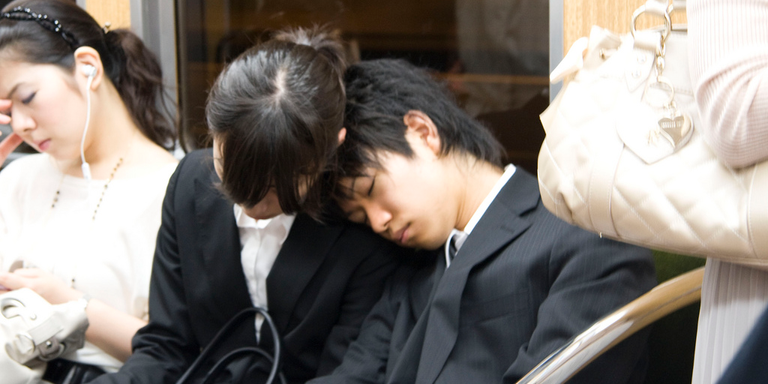
It is called Karoshi (かろうし) in Japan. I am not certain if a similar word exists in any other country, but even in Japan, where this word has become a mainstay of the lexicon, you hardly hear it being uttered, except in whispers and morose stares. He or she died from a heart attack, a stroke and sometimes they might say suicide.
To say that the Japanese work hard is an understatement. At the risk of overstating, I would say work in this country is an obsession as is the case with many things the Japanese do. Maybe obsession is not the word I am looking for, perhaps it is diligence. But whatever one calls it, it is causing some Japanese their lives and is part to blame for the falling birthrate (I will write about this soon). The society demands that you get whatever you are doing right. There is little avenue for failure, especially when you get into the corporate world, life becomes even more brutal.





In Japan, you are valued based on the number of hours you put in, in such a homogenous society the least infraction can make you a pariah; so doing fourteen hours per day, sometimes on weekends is not uncommon. The culture demands it.
I met Kosei at a beach party in summer. He had just been promoted to manager of a trucking company and he wanted his workers to learn English. During the conversation, I asked him how many hours he worked on average. He said about 17 hours per day. On Saturdays, he clocked in hours also. Throughout our conversation, he kept saying—Tsukareta—the Japanese word for tired. The beach party was his first attempt at a vacation in several years.
In fact, Japanese culture requires that you apologize to your colleagues when you return to work. While I am not allowed by law to work as many hours as the Japanese, I have experienced some of it. When I leave the office, I have to apologize for leaving before the Japanese teachers. As a side note I leave them at work, by the time I get to work they are already there; always.
And while I do not know any victim of kiroshi, it is quite common to find people who have at least met a victim of this phenomenon, especially if you live in or close to Tokyo. You have over 2,000 of these deaths every year so you can understand why so many people know someone or the family member of someone who die from overwork.
Through the lenses of an outsider, one wonders if it would have been possible to build the society they have now without people making the sacrifice. After all, there is no free lunch. And while the Japanese are claiming that the price of the ticket is too high. I wonder if these cultural values, were they to change, would see Japan taking a step or two backwards.
I believe the obsession with work originated from the aftermath of the Second World War. in an effort to rebuild the country a strong perhaps obsessive work ethic was ingrained into the public mind by the government through a well planned, well executed public relations program. This is pure speculation though, but if it were to be the case it will certainly explain a lot.
What an interesting brief on this social tragedy!
I can appreciate the impact this has on people's lives because in actual fact, the conditions in China are very similar. It was only a few years ago that Apple made news headlines with considerable pressure on increasing their work conditions and remuneration to employees at their assembly lines in China following the suicide of not one but several employees within the tightly controlled work-village.
To say that there is a notion of 9-5 in China is like saying work begins and ends when you clock in and clock out. Of course, that's not the case at all because the social default in China is to be essentially on call 24/7. You are expected to show your commitment to the company and your boss by taking on any number of tasks regardless of the time it takes to complete them, or when they are issued to you. Whether that's during "work hours" or not is irrelevant. Employees are expected to put in the hours to complete their tasks regardless of the time, and what saddens me is that the tasks always seem to be insurmountable.
Many of my friends who have freshly graduated are now struggling with this reality and are seeking work outside of China for these exact reasons. I don't blame them. Until the working culture in China changes, I can see more of this Japanese phenomenon happening in China and affecting the productivity of the nation as a whole.
Sometimes, allowing for real time off at the expense of absolute productivity is a necessity to allow for better mileage in the long term. Let's not also forget it preserves our sanity!
It is really sad. I was following what was happening at the Apple factories when I heard they had to install suicide nets. I was really sick to my stomach when I discovered this. I hope that the more we move into a high-tech industry where machines do most of the work and not the people we will kiss these days goodbye. For now we have to write about it and hope that things change. Thanks for the comment. It is a pleasure to know that there are many more out there who care and can use this platform to speak for those we will never hear from.
Actually Korean word has same thing. Japan n Korea use Chinese letters. So even pronunciation is different but have lots of same or similar words. Korean also work really hard for long time. Actually my ex-boss was found at the bathroom in his company. Fortunately he is still arrive but had to stay at the hospital in coma for a year. He woke up but cant say words...its so sad...but still it is ....